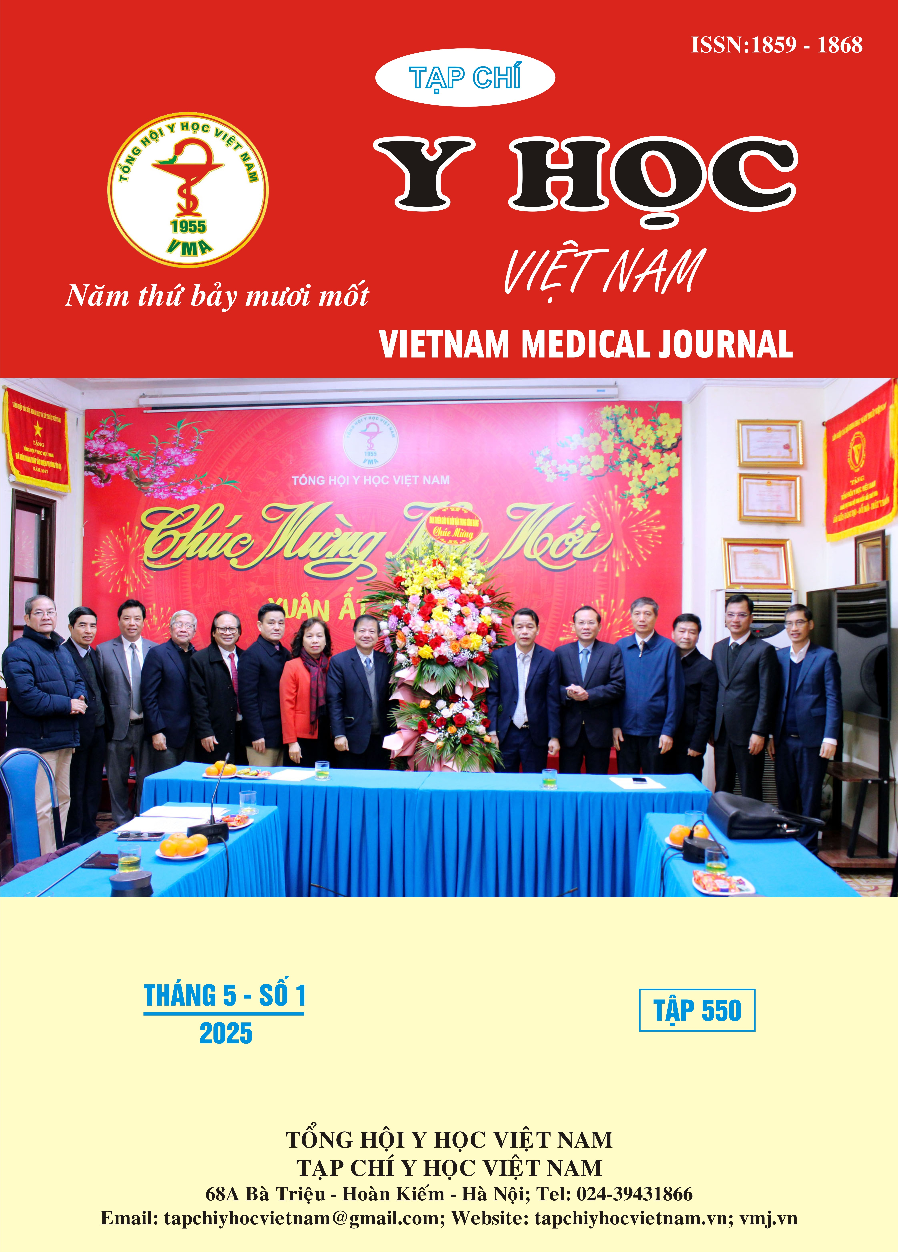MỐI LIÊN QUAN GIỮA CHỈ SỐ TRIGLYCERIDE - GLUCOSE VÀ KẾT CỤC NỘI VIỆN Ở BỆNH NHÂN CAO TUỔI CÓ HỘI CHỨNG VÀNH CẤP TẠI BỆNH VIỆN CHỢ RẪY
Nội dung chính của bài viết
Tóm tắt
Đặt vấn đề: Các yếu tố dự báo kết cục xấu trong hội chứng mạch vành cấp tính rất quan trọng trong thực hành lâm sàng vì bệnh động mạch vành là nguyên nhân gây tử vong hàng đầu trên toàn thế giới. Đối tượng và phương pháp nghiên cứu: Bệnh nhân ≥ 60 tuổi, nhập viện vì hội chứng vành cấp tại khoa Tim mạch can thiệp bệnh viện Chợ Rẫy từ tháng 9 năm 2024 đến tháng 12 năm 2024. Kết quả: Trong 165 đối tượng nghiên cứu từ tháng 9 năm 2024 đến tháng 12 năm 2024 tại khoa Tim mạch can thiệp bệnh viện Chợ Rẫy. Chỉ số TyG với cut off > 9,0 có thể dự báo các biến cố tim mạch bất lợi lớn với độ nhạy và độ đặc hiệu lần lượt là 62,39% và 35,71% KTC 95% (0.382 - 0.571). Người cao tuổi tỉ lệ gặp biến cố nội viện MACE ở nhóm có chỉ số “TyGi cao” cao hơn nhóm có chỉ số “TyGi thấp” (62,39% so với 37,61%). Tương quan thuận mạnh giữa chỉ số TyG và mức độ tổn thương động mạch vành bằng thang điểm Gensini có ý nghĩa thống kê với p=0,031, KTC 95% (0.803-16.784). Kết luận: TyG có thể không phải là dấu hiệu hữu ích để dự đoán tiên lượng nội viện viện ở những bệnh nhân được chẩn đoán mắc ACS. Nhưng dường như người cao tuổi tỉ lệ gặp biến cố nội viện MACE ở nhóm có chỉ số “TyGi cao” cao hơn nhóm có chỉ số “TyGi thấp”.
Chi tiết bài viết
Từ khóa
Chỉ số Triglyceride - Glucose, hội chứng vành cấp, người cao tuổi
Tài liệu tham khảo
2. Mozaffarian D, Benjamin EJ, Go AS, et al. Heart disease and stroke statistics—2016 update: a report from the American Heart Association. 2016;133(4):e38-e360.
3. Ungvari Z, Tarantini S, Sorond F, Merkely B, Csiszar AJJotACoC. Mechanisms of vascular aging, a geroscience perspective: JACC focus seminar. 2020;75(8):931-941.
4. Jiao Y, Su Y, Shen J, et al. Evaluation of the long-term prognostic ability of triglyceride-glucose index for elderly acute coronary syndrome patients: a cohort study. 2022;21(1):3.
5. Wang W, Yang J, Wang K, et al. Association between the triglyceride-glucose index and in-hospital major adverse cardiovascular events in patients with acute coronary syndrome: results from the improving care for cardiovascular disease in China (CCC)-acute coronary syndrome project. 2024;23(1):170.
6. Li J, Ren L, Chang C, Luo LJH, Research M. Triglyceride-glucose index predicts adverse events in patients with Acute Coronary Syndrome: a Meta-analysis of Cohort studies. 2021;53(09): 594-601.
7. Geng X, Zhang X, Li X, Zhong C, Hou MJC, Thrombosis/Hemostasis A. Triglyceride-glucose index as a valuable marker to predict severity of coronary artery disease: a retrospective cohort study. 2024;30:10760296241234320.
8. Yildirim E, Iyisoy A, Celik M, et al. The relationship between Gensini score and in-hospital mortality in patients with ST-segment elevation myocardial infarction. 2017;30:32-41.


